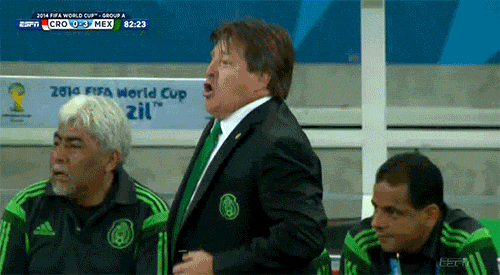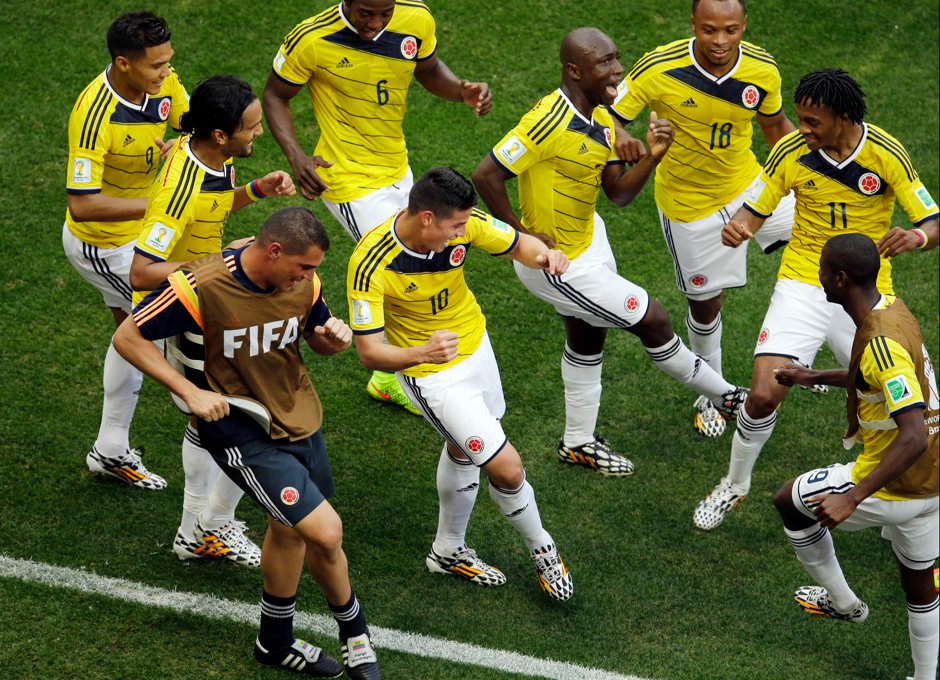This is the best World Cup ever! There will no doubt be Scrooges on the sidelines contesting this solid fact, because this is soccer, but even skeptics must be mourning the end of the first stage of the cup, as each of the eight starting groups has now settled who’s in first place, who’s in second, and who is at the airport, ticket in hand, forlornly waiting for the long trip home.
We, too, will be forlorn, having been able to pass two weeks with no guilty feelings at all—this is the World Cup!—slumping on the couch or joining friends at a bar to watch three consecutive games a day of pure, thrilling sport, every game a stunner, the whole sequence a fabulous surprise from beginning to end. Formerly dud teams have gone one-on-one with three-time champions. Italy, England, and Spain have been eliminated, hoary sports journalists have found themselves cheering for, of all countries, Costa Rica, whose team has put on a display of will and courage few could match, beating Italy and fighting England to a draw. Scoring has been at a near-all-time high, averaging almost three goals per game—the total for the group stage just one less than were scored in the entire cup in South Africa four years ago.
We’ve had Lionel Messi, of course, and the fearsome Dutch duo of Arjen Robben and Robin Van Persie. The gorgeous African teams lifted our hearts, with players like the Ivory Coast’s heroic Didier Drogba, and Nigeria’s Ahmed Musa and Michael Babatunde (who managed to have his wrist fractured by a teammate’s powerful shot). But of the African countries only Nigeria and Algeria have advanced—Algeria for the first time.
The real story is the seven teams from the Latin sphere that have somehow made it to the second round—more countries and more newcomers to this stage than any other region. Most astonishing was the performance of Costa Rica, which whomped that tough old-timer, Uruguay, 3-1 and then, astoundingly, beat Italy 1-0 and sent England packing in a goalless draw. There was Mexico, which fought Brazil to a sweaty, furious draw after beating Cameroon 1-0, and then dominated Croatia 3-1. The reaction of coach Miguel Herrera was typical of his country’s detached, ironic take on the team’s performance.

Mexican coach Miguel Herrara celebrating a goal against Croatia, June 23, 2014
And then there were the all-singing, all-dancing, God-fearing, clean-cut Colombians, all forty-eight gazillion of them, eleven out in the field and the rest packed into the stadiums, playing and watching such a clean and joyful game it was hard not to smile: even without their star, Radamel Falcao, who was out with an injury, the lineup scored four beautiful goals against Japan, three against Greece, two against unhappy Cote d’Ivoire, followed in every case by a quick prayer and a moment of salsa in front of the insane ranks of their compatriots. It’s been twenty-four years since Colombia made it to the group of sixteen, and the tension here in Bogotá during each game has been like that of patriots before the foreigners invade—the street vendors gathered around a shared radio, the rush-hour commuters listening as their children relayed a game to them over their cell phones, the roar that went up in every town and village with every goal, and then the victorious cheers, the tears, the dancing in the streets. New heroes emerged from each match, the twenty-two-year-old forward James (pronounced HA-mess) Rodríguez, and his partners-in-goals in an unusually well-rounded team: Teófilo Gutiérrez, Pablo Armero, and back-benchers Jackson Martínez and Juan Quintero. When victory against Japan was certain, goalkeeper Faryd Mondragón, at forty-two this tournament’s oldest player, was brought back to the post for a last minute of World Cup glory. Fate brought a good play by Japan his way, he blocked it effortlessly and waved good-bye, and at match’s end there was a satisfying amount of weeping all around.
Even José Pekerman, the circumspect coach, wept. Though he is Argentine, he is now beyond herodom, as far as Colombians are concerned. In 2012 the team was struggling even to qualify, until the team’s managers fired Leonel Álvarez and brought on the quiet, thoughtful Pekerman, whose World Cup experience was limited to a previous quarter-finals pass at the head of the Argentine team. In less than eighteen months he managed to turn the group´s mess of raw talent into the current golden lineup.
Some of us like to think that the Colombian team may have also had an inadvertent effect on another, somewhat more consequential contest: the presidential elections that took place on June 15, the day after Colombia’s crucial first World Cup match. It was a bitterly fought campaign, pitting the sitting president, Juan Manuel Santos, against a candidate, Óscar Iván Zuluaga, who for all practical purposes was designated by former president Álvaro Uribe to play Dmitri Medvedev to Uribe’s Vladimir Putin. Santos, who played the Medvedev role himself four years ago as Uribe’s hand-groomed candidate, is now in the third year of a peace process with a fifty-year-old guerrilla group—the Fuerzas Armadas Revolucionarias de Colombia, or FARC.
Advertisement
For the first time in its history the group seems genuinely inclined to sign an end to its own existence. Uribe is the president who, with Santos as his defense minister, fought the guerrillas into a corner. He is also the peace process’s enraged enemy, repeatedly declaring his hatred for Santos in rabid tweets; leaking the coordinates of the point in the jungle where a negotiating group for the guerrillas was set to gather for the trip to the peace talks’ headquarters in Havana; joining with retired and also perhaps still active military brass to denounce a process that recognizes the FARC as a belligerent force rather than as “subversives” or “terrorists.”
Colombia has been deeply wounded by the guerrillas. Seven days before the election, polls had Uribe’s designated candidate, Zuluaga, as much as eight points ahead of Santos. But on Saturday, June 14, the Colombian team made its victorious debut against Greece. The following day, 15 million Colombians got up, showered, dressed, had breakfast, and headed for the voting booths. At 4 PM the polls closed, and the results were clear a couple of hours later. A happy, partied-out, relaxed majority had decided to vote for the peace-bargainer, Santos, and not for the oddly passive Zuluaga and his quarrelsome, badgering mentor, former president Uribe. Santos won by a 6 percent margin.
Colombia, which is going into the second round of the World Cup with as many points and as many goals as Brazil, now must find a way past Uruguay, a very strong team from a country with a population half the size of Rio de Janeiro. A beneficient God forced their terrifying opponent, Luis Suárez, a compulsive chomper and goal-scorer, to bite an Italian player this week, for which move he has been benched for the rest of the tournament. (Uruguayan president José Mujica pointed out that players are not chosen for their manners, but Suárez has a long-standing problem with biting that he really should deal with.)
Could Colombia go on to beat, say, France? Will Mexico triumph over Holland? Could Colombia, after so many years of festering war, finally come to terms with itself and its aging guerrillas? Anything could happen in the imminent future because, in fact, the impossible has already happened, day after day, in this enthralling World Cup.



